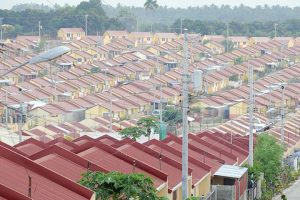Developer calls for formation of IATF to address housing crisis
MASS HOUSING developer Raemulan Lands, Inc. said the national and local governments must engage in a coordinated effort to address the housing crisis. On the sidelines of the EY Entrepreneur of the Year 2024 Philippines Awards Banquet, Raemulan Group Executive Officer Jacinto Ng, Jr. said the issue has already been declared a crisis. “If you […]

MASS HOUSING developer Raemulan Lands, Inc. said the national and local governments must engage in a coordinated effort to address the housing crisis.
On the sidelines of the EY Entrepreneur of the Year 2024 Philippines Awards Banquet, Raemulan Group Executive Officer Jacinto Ng, Jr. said the issue has already been declared a crisis.
“If you remember during the pandemic, COVID-19 was of course declared a national crisis, and the response of the government was to have an Interagency Task Force (IATF), and that brought everybody together,” he told BusinessWorld.
He said what is needed is more than a one-stop shop, but rather policy coordination at all levels of government and alongside private companies, developers, suppliers, and contractors.
“I don’t think it’s red tape. Definitely, I think in some areas, that’s part of the problem, but more than that, I think it’s an appreciation of the benefits of doing socialized housing and therefore, to be more proactive in promoting an environment for socialized housing,” he said.
“In our experience, families actually improve their economic status once they have a house of their own. So when their economic status improves, then theoretically, consumption and tax collection should improve in that locality also. So there will be a domino effect,” he added.
He said that benefits start as early the house construction stage, as the manufacture of building materials such as steel bars, pipes, and concrete create jobs.
“So the National Government should be able to provide support to the local government units (LGUs) as well, especially in the beginning. Because, of course, you need to establish the services first, and sometimes you need to invest in those,” he said.
“I think some LGUs are unfortunately not equipped, especially the LGUs that are far from the metropolis. So, I think that’s where collaboration between national and local governments is important,” he added.
He said demand for socialized housing is still on the rise and remains an underserved market.
“Our government in every election always highlights how many homeless families there are. During the last election, it was 6.5 million,” he said.
He said the study on which that estimate was based is old and a more recent estimate is 12.5 million families that do not own homes by 2030.
“So it’s a huge issue. If you do the math, it’s a trillion peso business,” he added.
He said that the segment is a big opportunity not only from a business point of view but also from a social point of view.
“It is of great importance because that’s millions of families that are suffering every single day by not having their own home,” he said.
“It’s a huge source of continuing poverty. It almost perpetuates poverty, especially when children are born into it,” he added.
Raemulan operates in Cavite, Laguna, Rizal, Bulacan, and Pampanga under the Pasinaya, Pagsikat, and Pagsibol brands.
He noted that costs continue to rise for social housing developments near the capital region.
“It is impossible for socialized housing to be affordable to the everyday minimum wage earner. Apart from that, there are actually restrictions against socialized housing in various municipalities in the periphery of Metro Manila,” he said.
“Some local government units cannot sustain socialized housing, and we do not know why. And so, they are not incentivizing it because I think they have some administrative or management issues,” he added.
He said that mass housing developers are having a hard time finding good locations that are not too far out from Metro Manila.
He said the company has a target to build 10,000 units per year, starting in 2024. — Justine Irish D. Tabile













